Bryan L. Programmable controllers. Theory and implementation
Подождите немного. Документ загружается.


849
CHAPTER
18
Local Area
Networks
SECTION
5
Advanced PLC
Topics and Networks
Industrial Text & Video Company 1-800-752-8398
www.industrialtext.com
• capable of supporting real-time control
• high data integrity (error detection)
• high noise immunity
• high reliability in harsh environments
• suitable for large installations
Two other common types of local area networks are business system networks
(e.g., Ethernet) and parallel-bus networks (e.g., Cluster/One). Business
networks do not require as much noise immunity as industrial networks,
since they are used in office environments. They also have less stringent
access time requirements. The user of a business work station can wait a few
seconds for information without problem, but a machine being controlled by
a PLC may require information within milliseconds to operate correctly.
Parallel-bus networks have requirements similar to business networks and
are intended for microcomputers and minicomputers used in office environ-
ments over short distances.
Different types of networks have different allowable distances between
connected devices. Figure 18-1 illustrates the distances at which different
types of networks and buses can be used. Note that long-distance communi-
cation still relies on public networks, such as telephone systems, which have
long-range data-channeling capabilities. However, developments in cable
TV data transmission are enabling data exchange of information via TV
cables at distances of up to 200 miles. Figure 18-2 illustrates a cable TV
network, developed by LANcity (Cable Modem Division of Bay Networks),
that allows connection between manufacturing plants and other locations.
1 m 10 m 100 m 1 km 10 km 100 km
Distance
Cost and Complexity
I/O Bus Networks
Local Area Networks
Long Distance Link Networks
Figure 18-1. Network distance ranges.
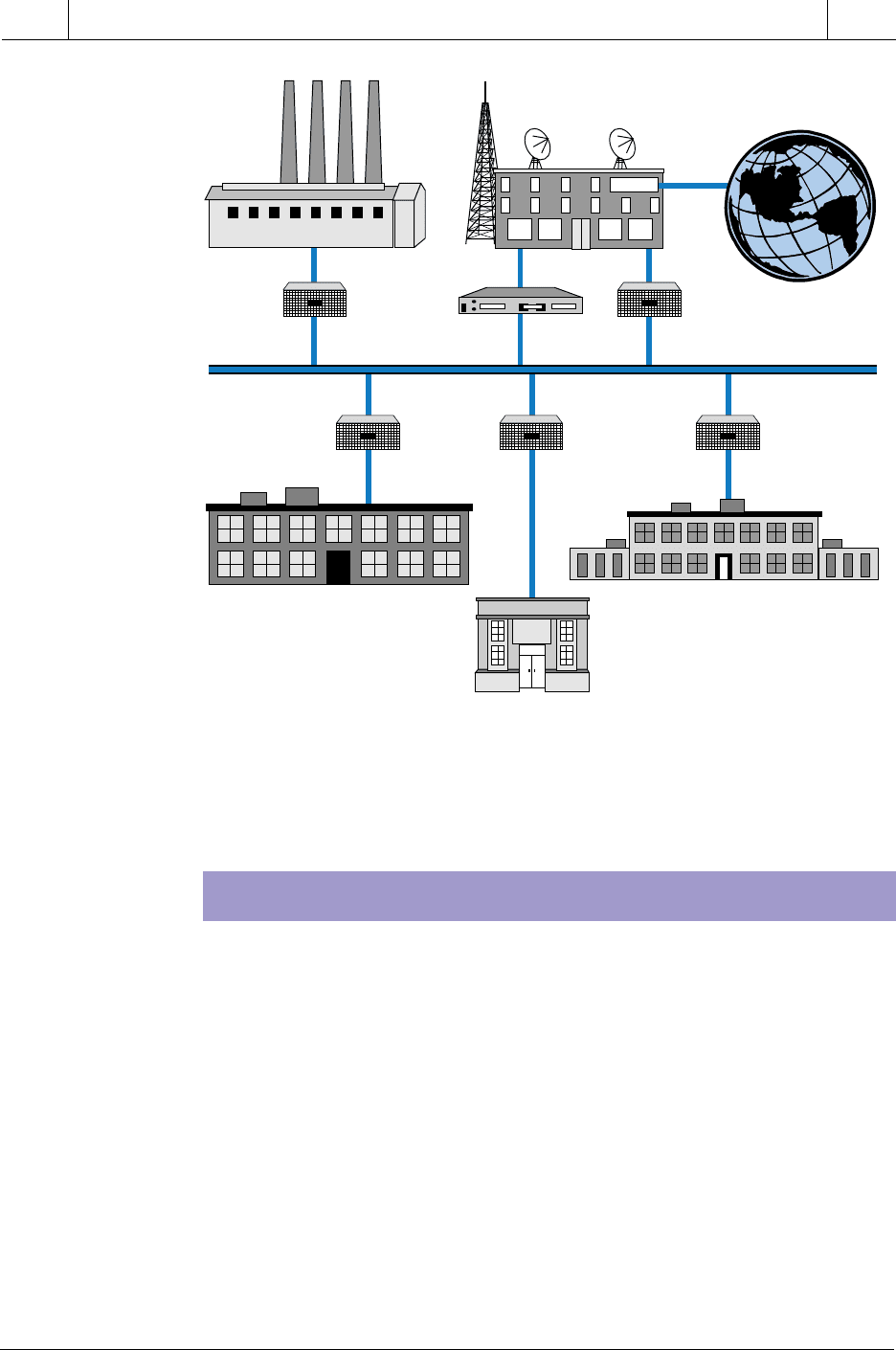
850
SECTION
5
Advanced PLC
Topics and Networks
Industrial Text & Video Company 1-800-752-8398
www.industrialtext.com
CHAPTER
18
Local Area
Networks
Figure 18-2. LANcity cable TV network.
ADVANTAGES OF LANS
Before local area networks came into use, two other methods were employed
to implement communication between PLCs. The first method used a pair of
wires to connect the output card of one PLC to the input card of a second PLC.
This method, which transmitted only one bit of information per pair of wires,
was expensive to install and very cumbersome to use. In the second method,
PLCs communicated through their programming ports via a central com-
puter, which was customer-supplied and programmed. The disadvantages of
this method were that it limited the data throughput rate to the baud rate of
the PLC’s programming port and that the network became unusable if the
central computer failed due to the system’s star topology.
The local area network offers distinct advantages over its predecessors
because it greatly reduces the cost of wiring for large installations. It also
uses a dedicated communication link to efficiently exchange large amounts
Plant #1
Plant #2 Plant #3
LCB LCRLCT
LCRLCB LCB
Headquarters
Internet
Cable TV
Headend
Cable TV
LCT–Transmaster: single-channel translator
LCB–Bridge: Ethernet bridge to cable TV
LCR–Router: Internet via cable TV
Router
Courtesy of LANcity—Cable Modem Division of Bay Networks, Andover, MA
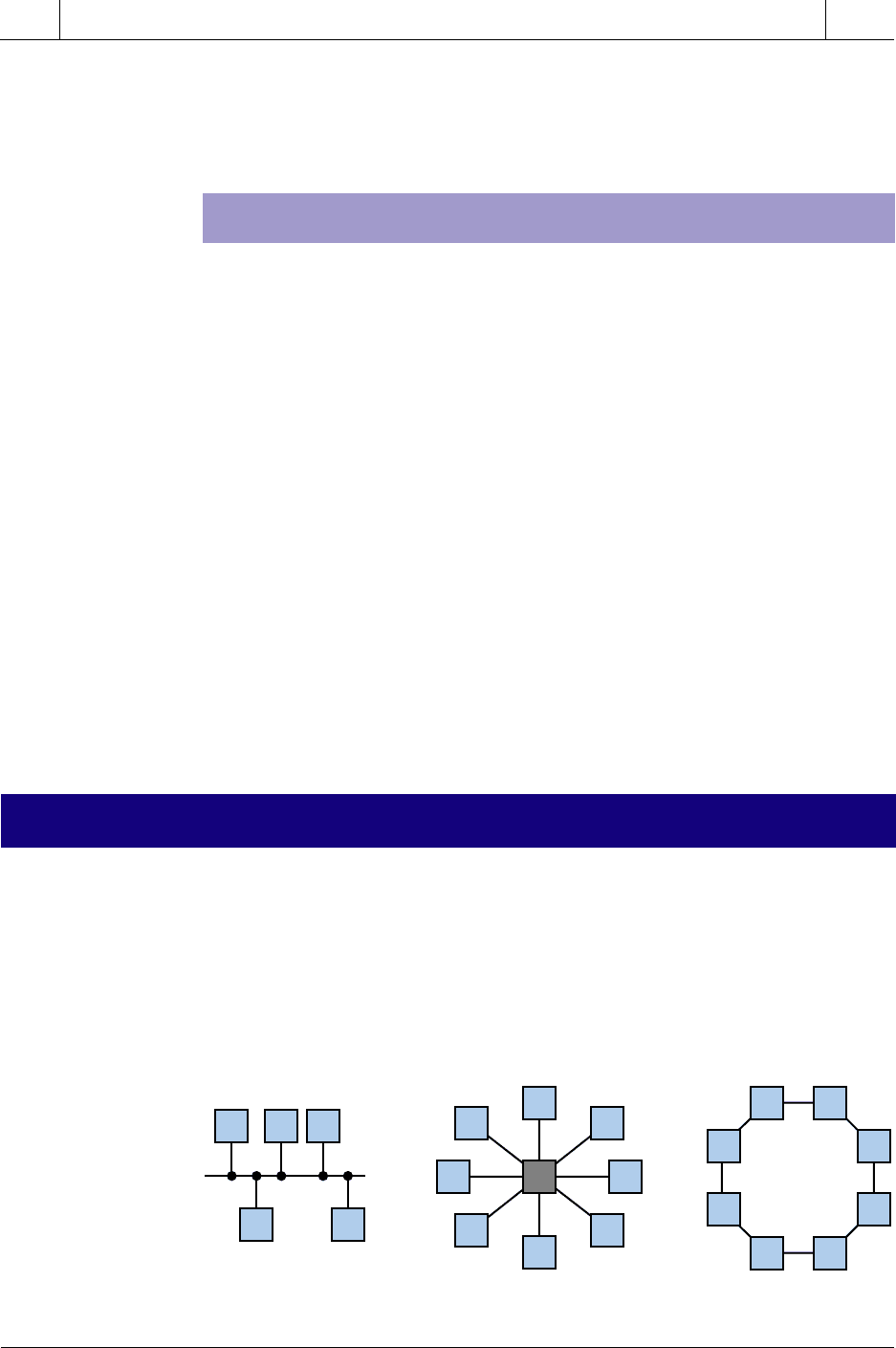
851
CHAPTER
18
Local Area
Networks
SECTION
5
Advanced PLC
Topics and Networks
Industrial Text & Video Company 1-800-752-8398
www.industrialtext.com
of usable data among PLCs and other hosts. Moreover, because each PLC
in the network can communicate independently with the others (without the
use of a central computer), a LAN does not have the disadvantage of
depending solely on one computer.
RingStarBus
LAN APPLICATIONS OF THE PLC
Centralized data acquisition and distributed control are the most common
applications of local area networks. Data collection and processing, when
performed by an individual controller, can burden the processor’s scan time,
consume large amounts of memory, and complicate the control logic pro-
gram. A data highway configuration, in which all data is passed to a host
computer that performs all data processing, eliminates these problems. Also,
distributed control applications allocate control functions, once performed
by a single controller, among several controllers. This eliminates dependence
on a single controller and improves performance and reliability. To use the
distributed processing approach, a local area network and the PLCs attached
to it must provide the following functions:
• communication between programmable controllers
• upload capability to a host computer from any PLC
• download capability from a host computer to any PLC
• reading/writing of I/O values and registers to any PLC
• monitoring of PLC status and control of PLC operation
18-3 NETWORK TOPOLOGIES
Figure 18-3. Bus, star, and ring topologies.
The topology of a local area network is the geometry of the network, or how
individual nodes are connected to it. A network’s topology greatly affects its
throughput rate, implementation cost, and reliability. The basic network
topologies used today are star, common bus, and ring (see Figure 18-3). We
should note, however, that a large network, such as the one shown in Figure
18-4, may consist of a number of interconnected topologies.
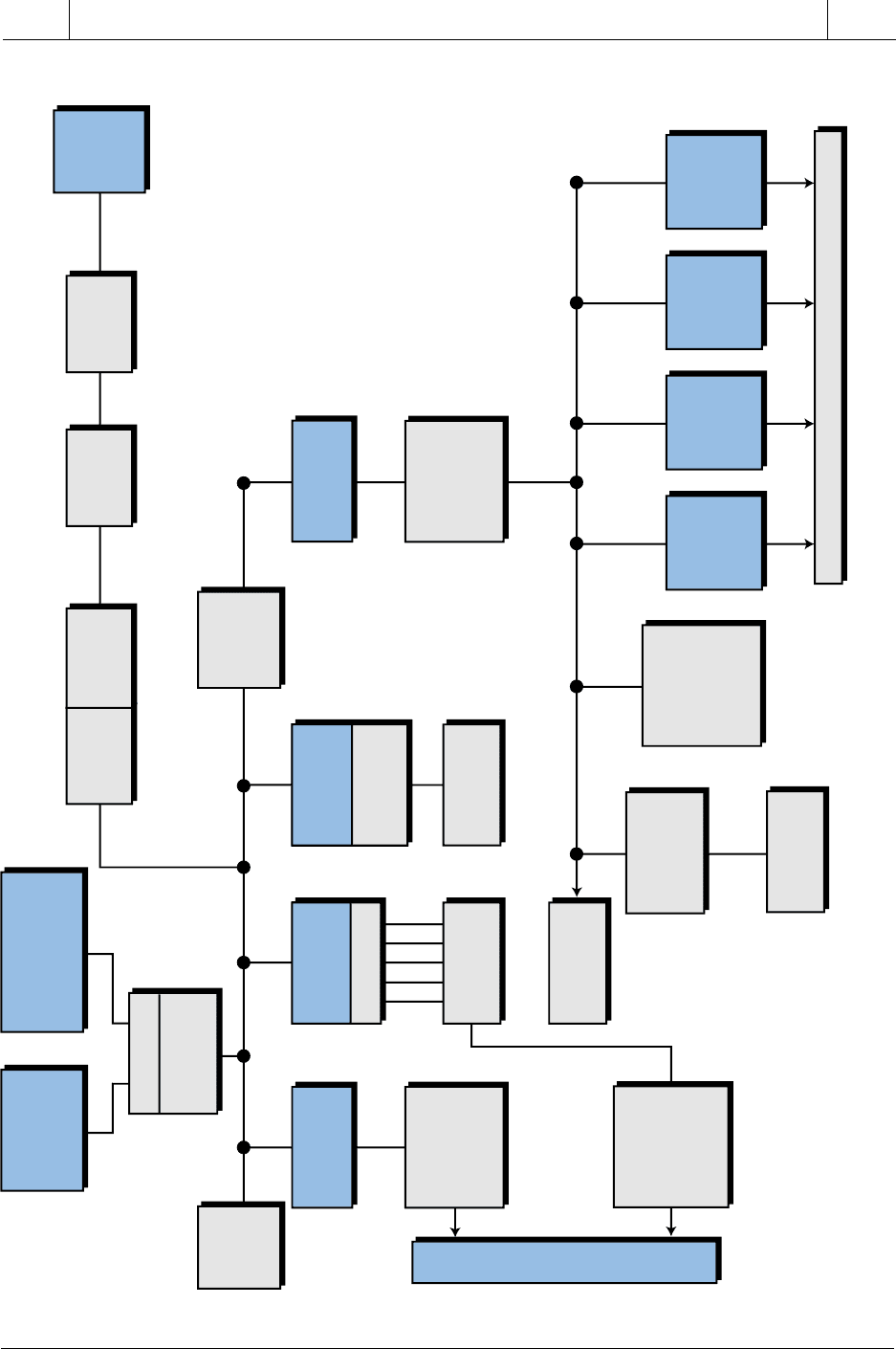
852
SECTION
5
Advanced PLC
Topics and Networks
Industrial Text & Video Company 1-800-752-8398
www.industrialtext.com
CHAPTER
18
Local Area
Networks
Figure 18-4. Large network using many different topologies.
Closed
Circuit
TV
Voice
Communications
Converter
Broadband
Modem
Head
End
Modem
Broadband
Modem
Broadband
Modem
Broadband Highway
Broadband
Modem
File
Server
Data
Storage
Broadband
Modem
Baseband
to Host
Gateway
Programming
Console
with
Baseband
Interface
PLC
with
Baseband
Interface
PLC
with
Baseband
Interface
PLC
with
Baseband
Interface
PLC
with
Baseband
Interface
PLC
with
Broadband
Interface
PLC
with
RS-232C
or RS-422
Interface
Broadband
to
Baseband
Gateway
Converter
Broadband
Modem
Telephone
Modem
Telephone
Modem
Broadband
to Host
Gateway
RS-232C RS-232C
Phone
Line
Process I/O
Various
Consoles
Printers
and Hosts
Host
Computer
RS-232C
or RS-422
Remote
Terminal
or
Host
Repeater
P
r
o
c
e
s
s
I/O
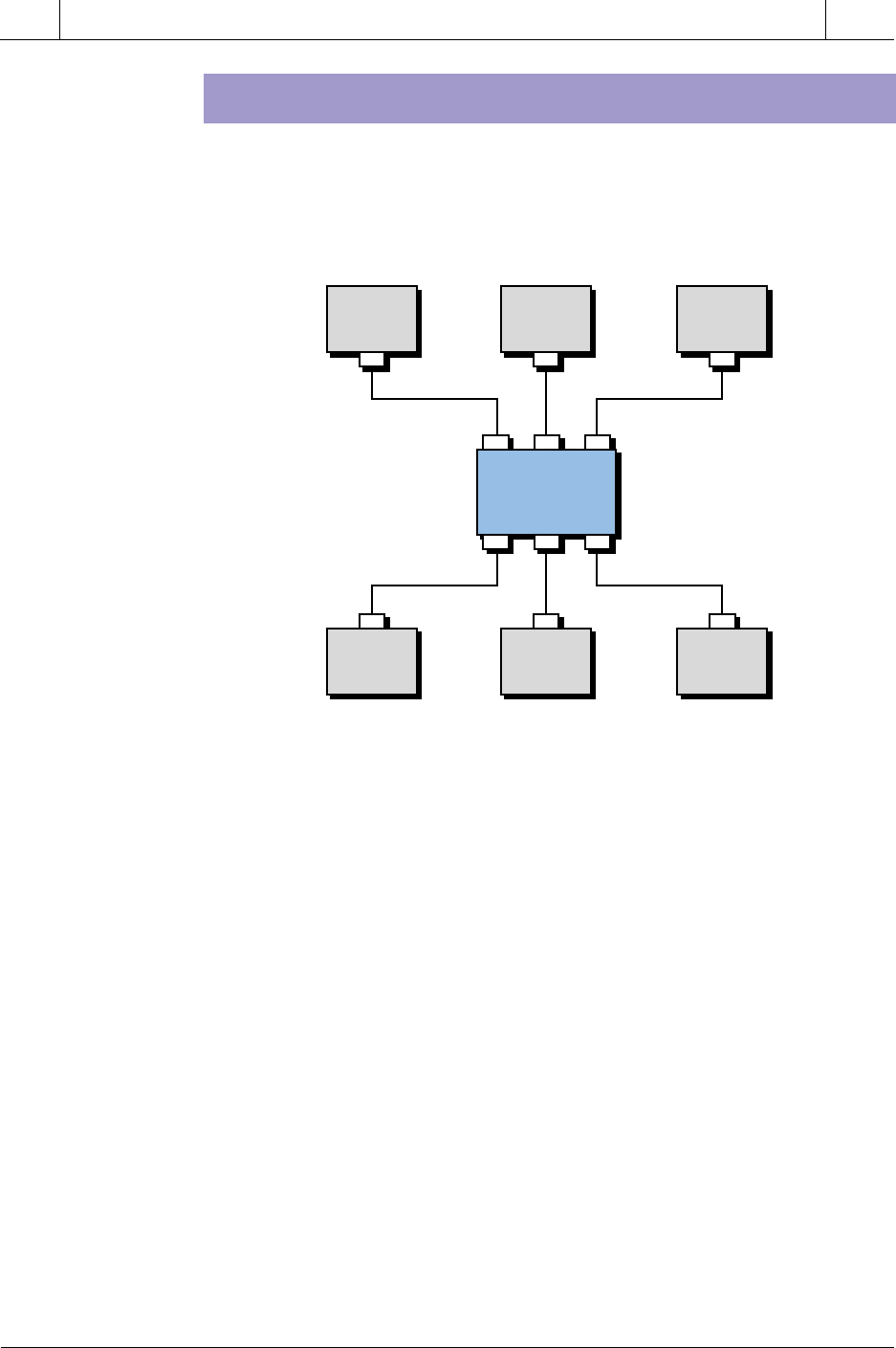
853
CHAPTER
18
Local Area
Networks
SECTION
5
Advanced PLC
Topics and Networks
Industrial Text & Video Company 1-800-752-8398
www.industrialtext.com
STAR
As mentioned previously, the first PLC networks consisted of a multiport
host computer with each port connected to the programming port of a PLC.
Figure 18-5 shows this arrangement, known as star topology. The network
controller can be either a computer, a PLC, or another intelligent host.
Network
Controller
PLC PLC PLC
PLC PLC PLC
Figure 18-5. Star topology.
Most commercial computer installations are star networks, in which many
terminals are tied to a central computer. This star topology is the same as the
one used in telephone networks, where the central node has the task of
establishing connections between the various network stations. The main
advantage of this topology is that it can be implemented with a simple point-
to-point protocol—that is, each node can transmit whenever necessary. If
error checking is not required or if a simple parity bit per character check will
suffice, then a dumb terminal, a terminal without network intelligence
(e.g., a display monitor), can be a node. Star topology, however, has the
following disadvantages:
• It does not lend itself to distributed processing due to its dependence
on a central node.
• The wiring costs are high for large installations.
• Messages between two nodes must pass through the central node,
resulting in low throughput.
• There is no broadcast mode, which lowers throughput even more.
• Failure of the central node will crash the network.
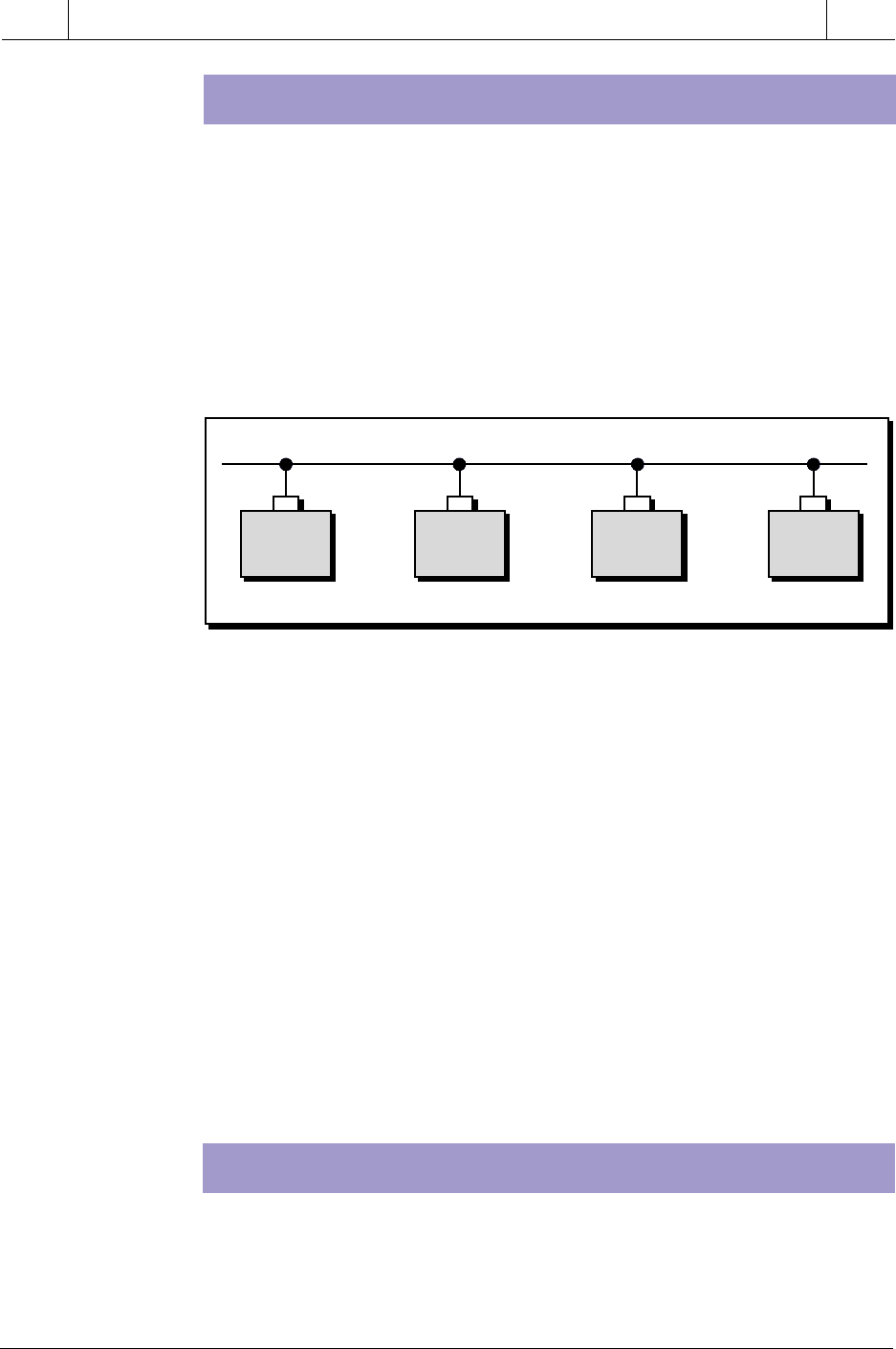
854
SECTION
5
Advanced PLC
Topics and Networks
Industrial Text & Video Company 1-800-752-8398
www.industrialtext.com
CHAPTER
18
Local Area
Networks
COMMON BUS
The common bus topology has a main trunkline to which individual PLC
nodes are connected in a multidrop fashion (see Figure 18-6). A coaxial
cable with proper terminators is typically the communication medium for the
trunkline. In contrast to the star topology, communication in a common bus
network can occur between any two nodes without passing information
through a network controller. An inherent problem of this scheme, however,
is determining which node may transmit at which time, to avoid data collision.
Several communication access methods have been developed to solve this
problem. We will discuss these later.
Figure 18-6. Common bus topology.
Common bus topologies are very useful in distributed control applications,
since each station has equal independent control capability and can ex-
change information at any given time. Also, this topology requires little
reconfiguration to add or remove stations from the network. The main
disadvantage of this topology is that all of the nodes depend on a common bus
trunkline. A break in this trunkline can affect many nodes.
Another configuration of the bus topology is the master/slave bus topology,
consisting of several slave controllers and one master network controller
(see Figure 18-7). In this configuration, the master sends data to the slaves;
if the master needs data from a slave, it will poll (address) the slave and wait
for a response. No communication takes place without the master initiating
it. The implementation of a master/slave bus topology uses two pairs of
wires. Through one pair of wires, the master transmits data and the slaves
receive it. Through the other pair of wires, the slaves transmit data and the
master receives it.
RING
Ring topology, shown in Figure 18-8, is not used in industrial environments
because failure of any node (not just the master) will crash the network,
unless the failed node is bypassed. We mention it here because it does not
require multidropping due to its point-to-point connection restriction (see
PLC PLC PLC PLC
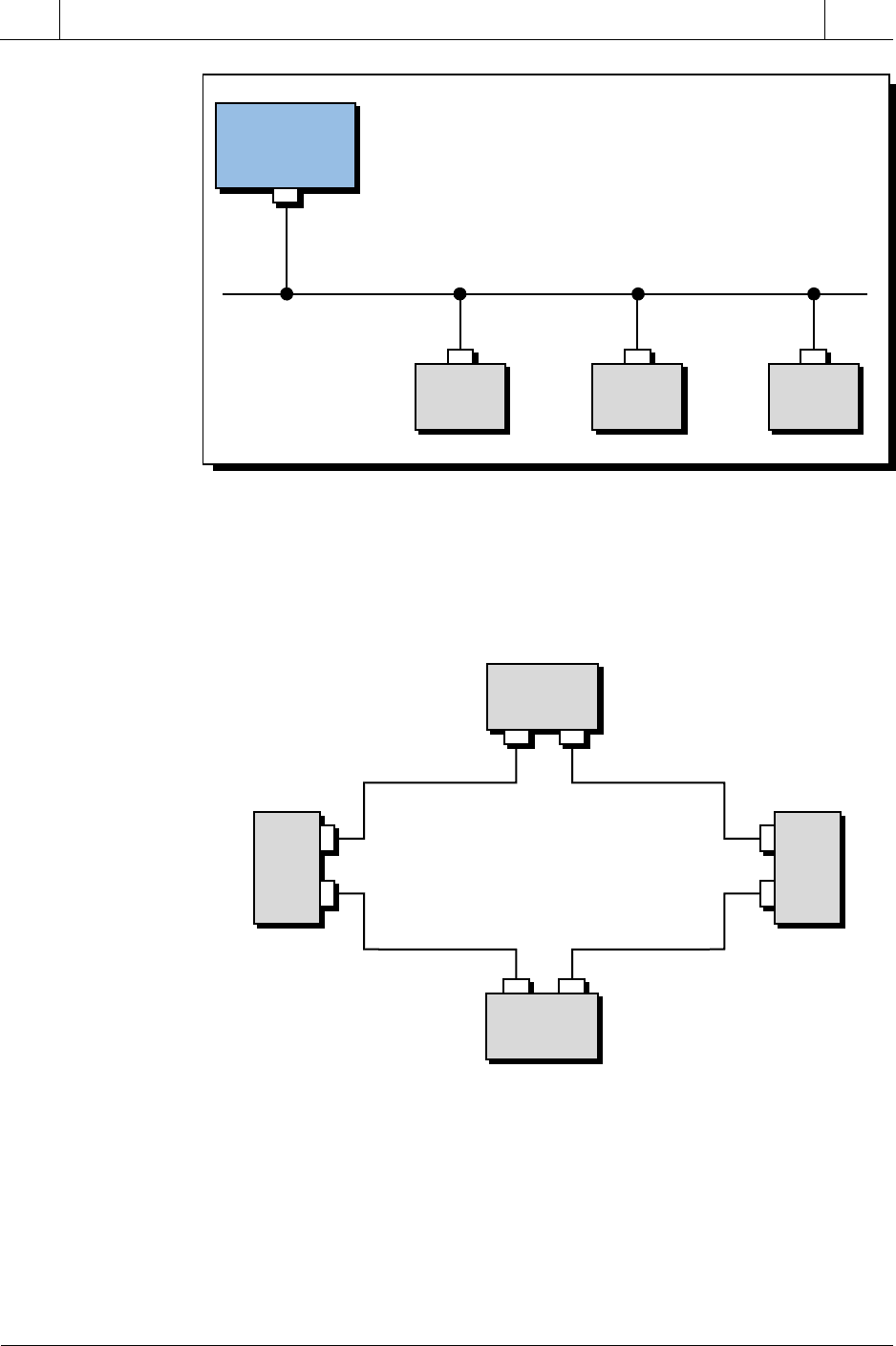
855
CHAPTER
18
Local Area
Networks
SECTION
5
Advanced PLC
Topics and Networks
Industrial Text & Video Company 1-800-752-8398
www.industrialtext.com
PLC
PLC
PLC PLC
Figure 18-8. Ring topology.
Some LAN manufacturers have overcome the problem of node failure in a
ring topology by using a wire center. The wire center, shown in Figure 18-9,
automatically bypasses failed nodes in the ring. This star-shaped ring
topology, however, requires twice as much wire as standard ring topology.
Therefore, it must offer some other significant advantage (such as use in fiber
optics) to be practical for large installations.
Section 18-5). Thus, it is a good candidate for fiber-optic networks, since
fiber-optic transmission media allows fast communication speed and long-
distance connectivity.
Figure 18-7. Master/slave bus topology.
PLC
(Slave)
Network
Controller
(Master)
PLC
(Slave)
PLC
(Slave)
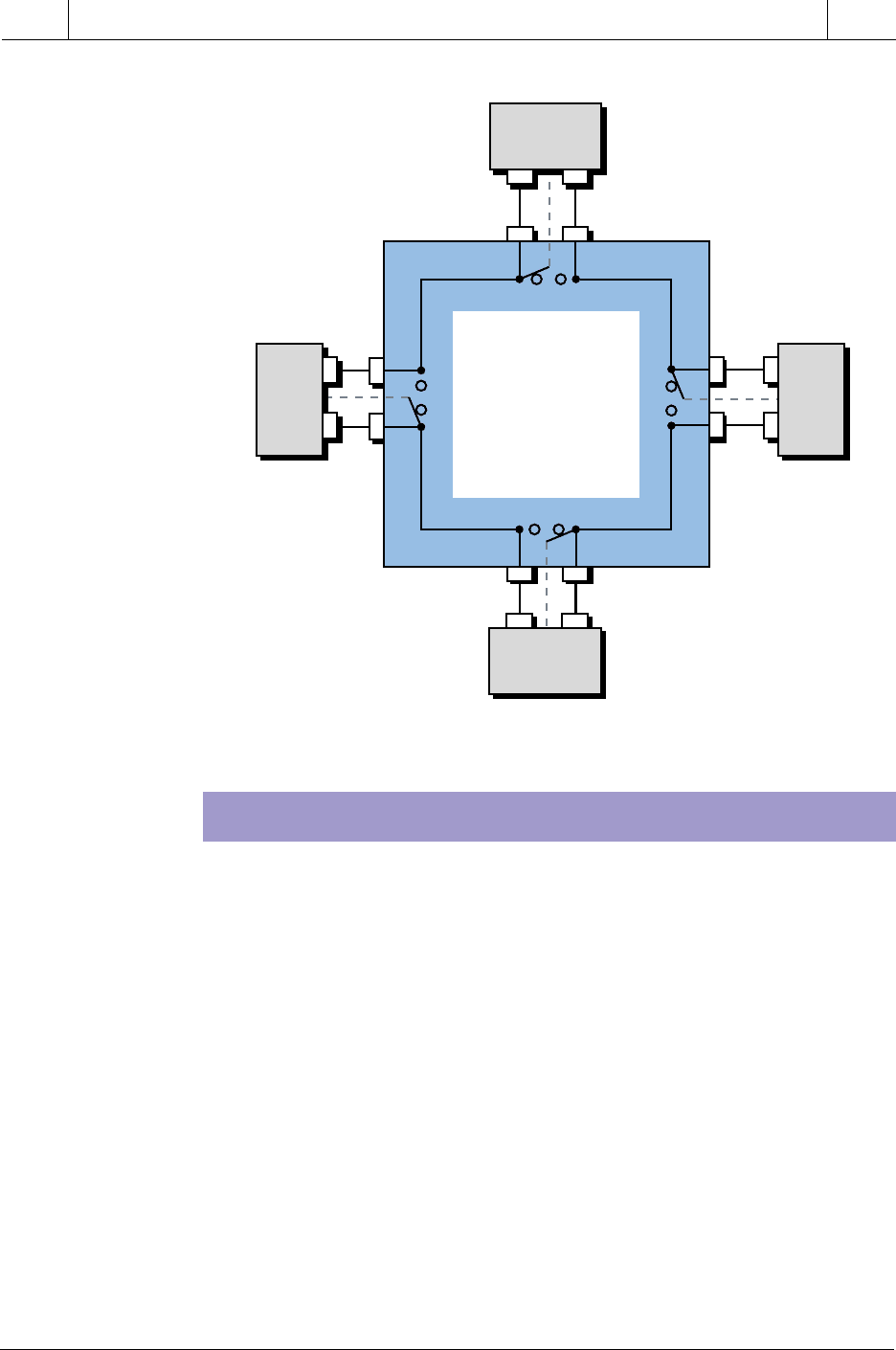
856
SECTION
5
Advanced PLC
Topics and Networks
Industrial Text & Video Company 1-800-752-8398
www.industrialtext.com
CHAPTER
18
Local Area
Networks
PLC
PLC
PLC
PLC
Wire
Center
DATA TRANSMISSION TECHNIQUES
Figure 18-9. Star-shaped ring topology with a wire center.
Several transmission techniques are used to send data through a network (see
Figure 18-10). Among the most common are:
• Manchester encoding
• frequency shift keying (FSK)
• nonreturn to zero invert on ones (NRZI)
Manchester encoding, also referred to as baseband transmission encoding,
changes the signal polarity to positive for every logic 1 and to negative for
every logic 0. During normal operation, the DC voltage on the cable is
zero. Frequency shift keying (FSK) utilizes two frequencies to transmit
logical values of 1 and 0. The nonreturn to zero invert on ones (NRZI)
transmission technique involves a signal change whenever the next transmit-
ted value is a 1. Ethernet networks use Manchester coding as their data
transmission method.
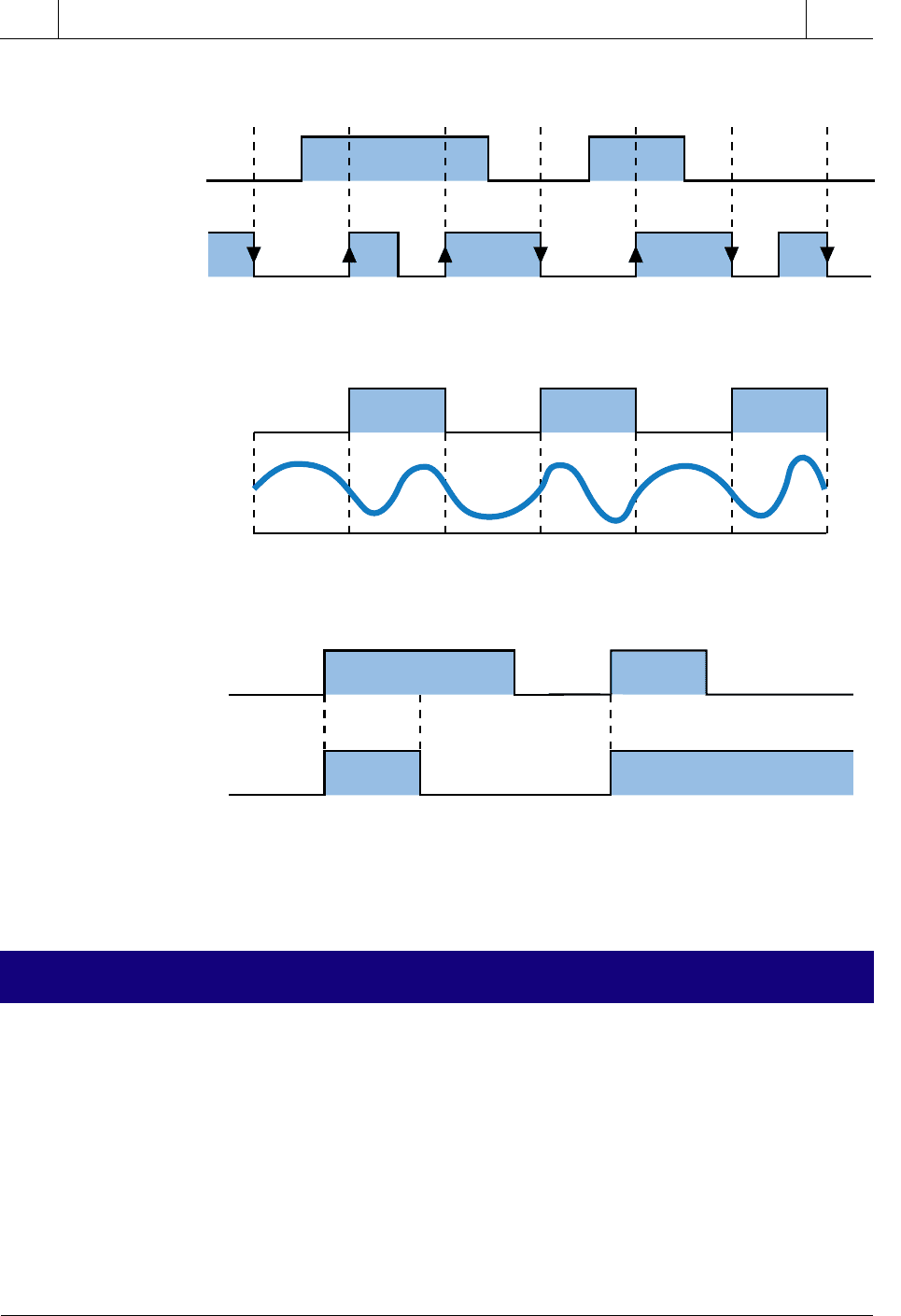
857
CHAPTER
18
Local Area
Networks
SECTION
5
Advanced PLC
Topics and Networks
Industrial Text & Video Company 1-800-752-8398
www.industrialtext.com
18-4 NETWORK ACCESS METHODS
An access method is the manner in which a PLC accesses the network to
transmit information. In other words, it defines the method used by the node
to talk through the network. As mentioned in the previous section, a bus
topology requires that the nodes take turns transmitting on the medium. This
process requires that each node be able to shut down its transmitter without
interfering with the network’s operation. This can be done in one of the
following ways:
• with a modem that can turn off its carrier
Figure 18-10. Data transmission techniques: (a) Manchester encoding, (b) frequency
shift keying, and (c) nonreturn to zero invert on ones.
0 1 1 0 1 0 0
(a) Manchester encoding (baseband)
0 1 0 1 0 1
(b) Frequency shift keying (FSK)–(carrier band)
0 1 10100
(c) Nonreturn to zero invert on ones (NRZI)
Data
Signal
Transmitted
Signal

858
SECTION
5
Advanced PLC
Topics and Networks
Industrial Text & Video Company 1-800-752-8398
www.industrialtext.com
CHAPTER
18
Local Area
Networks
• with a transmitter that can be set to a high independence state
• with a passive current-loop transmitter, wired in series with the other
transmitters, that shorts when inactive
Although many access methods exist, the most commonly used ones are
polling, collision detection, and token passing.
POLLING
The access method most often used in master/slave protocols is polling.
In polling, the master interrogates, or polls, each station (slave) in sequence
to see if it has data to transmit. The master sends a message to a specific
slave and waits a fixed amount of time for the slave to respond. The slave
should respond by sending either data or a short message saying that it has
no data to send. If the slave does not respond within the allotted time, the
master assumes that the slave is dead and continues polling the other slaves.
Interslave communication in a master/slave configuration is inefficient,
since polling requires that data first be sent to the master and then to the
receiving slave. Since master/slave configurations use this technique, polling
is often referred to as the master/slave access method.
COLLISION DETECTION
Collision detection is generally referred to as CSMA/CD (carrier sense
multiple access with collision detection). In this access method, each node
with a message to send waits until there is no traffic on the network and then
transmits. While the node is transmitting, its collision detection circuitry
checks for the presence of another transmitter. If the circuit detects a collision
(two nodes transmitting at the same time), the node disables its transmitter and
waits a random amount of time before trying again. This method works well
as long as the network does not have an excessive amount of traffic.
Each collision and retry uses time that cannot be used for transmission of
data; therefore, the network’s throughput decreases and access time increases
as traffic increases. For this reason, collision detection is not popular in
control networks, but it is popular in business applications. In industrial
applications, collision detection can be used for data gathering and program
maintenance in large systems and real-time distributed control applications
with a relatively small number of nodes.
TOKEN PASSING
Token passing is an access technique that eliminates contention among the
PLC stations trying to gain access to the network. In this technique, the PLCs
pass a token, which is a message granting a polled station the exclusive, but
